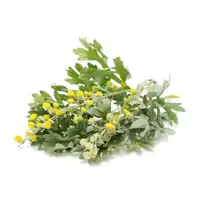Wormwood

Wormwood or Artemisia belongs to the genus of herbaceous shrubs from the Astrovs family. Wormwood got its original Latin name thanks to the ancient Greek word αρτεμής, which means "healthy. " The name perfectly characterizes the properties of wormwood as plants that began to be used for medicinal purposes thousands of years ago. According to ancient Greek legends, the goddess Artemis or the Patroness of the Virgins helped with the help of wormwood to cure female diseases.
There are over four hundred species of wormwood in nature, some of which are used in the food industry and in pharmacological production. For example, the famous tarragon or tarhun spice refers to the species of wormwood Artemisia dracunculus. Extracts from bitter wormwood or citwara are used for the production of medicinal infusions and other medicines. In addition, some types of alcoholic beverages are made on the basis of wormwood extract, for example vermouth or absinthe. Essential oil, which is contained in wormwood, is used in the cosmetic and perfume industries.
Composition of wormwood
Wormwood is included in the list of ancient medicinal plants. The chemical composition of wormwood contains natural amino acids, as well as potassium salts, tannins, and essential oils. The organic acids contained in wormwood are incredibly useful for the human body. Essential oil of wormwood is enriched with vitamins of group A, B, and also contains ascorbic acid and other useful natural compounds. The benefits of wormwood for the human body lie primarily in the chemical composition of the plant.
Benefits of wormwood
Even the ancient Greeks identified and described the beneficial properties of wormwood, which consisted in improving digestion and treating disorders associated with the intestinal-gastric tract. Nowadays, wormwood is used to produce drugs that help in the treatment of gastritis, liver and gallbladder diseases. Hamazulen, a substance that helps with rheumatism, asthma, malaria, eczema and other skin diseases, is obtained from the aboveground part of wormwood. Wormwood is widely used in traditional medicine, including domestic medicine.
Decoctions based on wormwood are actively used in homeopathy. The benefits of wormwood are expressed in the ability to arouse appetite and normalize digestive processes. Medicines based on wormwood are used not only in the inside, but also externally. For example, ointments with wormwood extract have healing, anti-inflammatory and painkiller properties. Wormwood boil or tincture compresses help with dislocations and sprains.
The harms of wormwood
In addition to the benefits, the harm of wormwood is also known, which can have serious consequences if you do not comply with the recommended dosages of medicines or self-medicate. In addition, doctors advise to refrain from using drugs with wormwood extract during pregnancy and breastfeeding. The harm of wormwood can be expressed in the symptoms of toxic poisoning with poisonous substances that are contained in the plant and over time accumulate in the human body.
Excessive consumption of wormwood can lead to nervous disorder, irritability, hallucinations, and subsequently convulsions and convulsions. You should take an examination course and consult with doctors before starting any medicines, including those containing extracts and essential oils of wormwood.
wormwood 24.8 kCal
Energy value of wormwood (Ratio of proteins, fats, carbohydrates - ju):
Proteins: 1.5 g (~ 6 kCal)
Fats: 0 g (~ 0 kCal)
Carbohydrates: 5g (~ 20kCal)
Energy ratio (bj | y): 24% | 0% | 81%
 Español
Español Français
Français Português
Português Русский
Русский 简体中文
简体中文 繁體中文
繁體中文 日本語
日本語 한국어
한국어 العربية
العربية Türkçe
Türkçe Қазақ
Қазақ Deutsch
Deutsch Italiano
Italiano Українська
Українська
